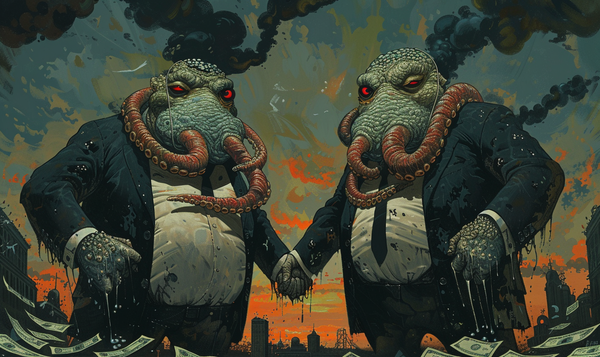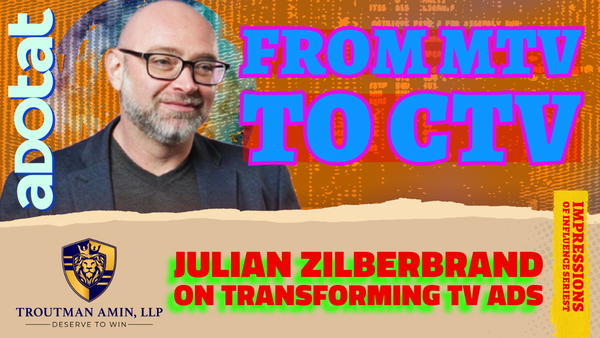Ah, the ad tech world. Just when you think you've seen it all, it manages to surprise you with a new level of audacity.
2023 had delivered us a scandal so juicy, so ripe with intrigue, it could make the pages of a thriller novel. Comcast's FreeWheel has been caught allegedly engaging in what can only be described as a Machiavellian plot to squeeze every last penny
from its DSP partners with its “Smart Bidding” project. Think of it as a digital sleight of hand, where bid requests are duplicated with slight variations to milk more revenue. It's like finding out your favorite magician is actually just a con artist with really good PR.
FreeWheel's alleged actions supposidly sent ripples through the ad tech industry, though perhaps not the tidal waves one might expect.
Instead of an uproar and
calls for immediate reform, the reaction has been more akin to a collective shrug. It's as if everyone has become so jaded by the constant stream of industry scandals that nothing truly shocks them anymore.
Meanwhile, FreeWheel's PR machine is working overtime, spinning their "Smart Bidding" project as a misunderstood innovation, designed to optimize ad slots and improve the overall ad experience. In their narrative, it's a revolutionary tool that will save
connected television, enabling shorter ads to fit seamlessly into longer slots. It's a bit like selling snake oil and calling it a miracle cure, but with a digital twist.
The Plot Thickens: FreeWheel’s Grand Illusion
FreeWheel, with the innocence of a fox in a henhouse, claims their “Smart Bidding” is nothing more than a benevolent attempt to optimize ad slots. In reality, it's a devious scheme where duplicate bid requests are sent out with minor tweaks,
making them look like separate, unique opportunities. Picture this: you're at an auction, and instead of one bid for the prized antique vase, there are twenty identical ones from different angles. You think you're bidding on twenty different vases, but it's just the same one, over and over again. This digital mirage not only confuses buyers but inflates prices, ensuring that advertisers end up in a bidding war against themselves.
What’s even more infuriating is the
sheer audacity with which FreeWheel has rolled out this project. Rather than being upfront with their partners about the potential impacts, they've chosen to introduce it selectively and covertly. This stealthy deployment has allowed them to test the waters without facing immediate backlash. It’s like introducing a new tax under the cover of darkness and hoping no one notices until it’s too late. The industry's reaction, or lack thereof, is a testament to how numb we've all become to these kinds
of shenanigans. FreeWheel’s defense is that their project is still in its nascent stages and that any leaks are merely misinterpretations of their grand vision. In their eyes, “Smart Bidding” is the savior of connected television, enabling shorter ads to fit seamlessly into longer slots. It's a bit like selling snake oil and calling it a miracle cure.
Pluto TV: The Cosmic Offender
But wait, there’s more! Enter Pluto TV, Paramount's golden child of free
ad-supported TV. They’ve been accused of engaging in bid duplication on a scale that makes FreeWheel look like small potatoes. Adweek reports that Pluto TV sent out a staggering 9.4 billion bid requests in a single day in June. To put that into perspective, Tubi, another big player, only managed 133 million in the same timeframe. Even heavy hitters like VIZIO WatchFree+ could only muster 1.3 billion. It’s as if Pluto is the digital equivalent of a loudmouth auctioneer, yelling bids into a canyon
to hear the echo.
Pluto TV's defense? They claim it's all about ensuring diverse ad experiences and preventing viewers from seeing the same ad repeatedly. They argue that sending multiple bid requests is necessary to keep the ad pool fresh and varied. Sure, and I’ve got a bridge to sell you. The reality is that this tactic artificially inflates demand, driving up the cost of ads and making advertisers pay through the nose for the privilege of appearing on their
platform. The disparity between the number of bid requests sent by Pluto and other platforms is so vast that it raises serious questions about the integrity of their ad-selling practices. It's like they’ve discovered the secret to printing money, and they’re doing it with reckless abandon.
The SSPs: Masters of the Duplicate Universe
Let’s not forget the role of SSPs in this grand charade. These platforms have perfected the art of bid duplication under the
guise of "yield optimization." The theory is that by sending more bid requests, publishers can maximize their revenue, as more bids theoretically lead to higher CPMs. It’s a beautiful theory, much like communism—great on paper, disastrous in practice. Fraudulent publishers have taken this tactic and run with it, flooding the market with duplicate bid requests through multiple SSPs, knowing full well that DSPs can’t de-duplicate fast enough. It’s like digital hydroponics for fraudsters—plant one
seed, harvest a hundred times.
Dr. Augustine Fou, a well-known fraud researcher, has long warned about this gray area in ad tech. He points out that while SSPs claim their algorithms are designed to help publishers, they’re often exploited by those looking to game the system. The result? Advertisers end up bidding against themselves, paying more for the same ad slot multiple times over. This isn't just a loophole; it's a gaping chasm of deceit. The problem is
compounded by the fact that many in the industry turn a blind eye to these practices, either out of ignorance or because they’re benefiting from the increased revenue. It’s a classic case of the fox guarding the henhouse, with advertisers left to pick up the pieces.
The Buyers: Duped and Desperate
Now, let’s spare a thought for the poor, beleaguered ad buyers. They enter the programmatic marketplace assuming a level of logic and fairness that’s about as
realistic as a unicorn sighting. In theory, a publisher sends bid requests to SSPs, which gather offers from DSPs, and the highest bidder wins the slot. Simple, right? Wrong. When those bid requests are duplicated, buyers sift through dozens of identical bids, unable to distinguish between them. It’s like trying to pick a needle out of a stack of needles. They end up overpaying, driving up their own costs in a futile game of cat and mouse.
One buyer at adage recounted how Pluto TV’s practices skewed their ad budget. Despite representing just 5-10% of the audience reach, Pluto TV managed to gobble up 50% of their client’s budget. Another source revealed that Pluto’s winning bids were often 55% above the floor price, compared to the 10-30% overage typical for other platforms. It’s like
buying a cup of coffee and finding out you’ve been charged for a gourmet meal. This disparity not only strains budgets but also erodes trust in the entire programmatic buying process. Advertisers feel like they're being taken for a ride, and the lack of transparency only adds to their frustration. It's a vicious cycle, where the quest for profit undermines the very foundations of fair and efficient ad buying.
Colossus SSP: Another Titan Toppled
As if this
wasn’t enough, ad tech giant Colossus SSP has been accused of misleading advertisers into buying audiences they never intended to target. The fallout from this scandal has been predictably dramatic, with advertisers frantically auditing their buys to uncover any hidden fraud. Once again, the industry’s collective response was one of shock and surprise, akin to discovering gambling in a casino. It's almost laughable how these scandals unfold with a sense of déjà vu, yet the industry acts like
it's witnessing a rare celestial event.
Everyone claimed they were "surprised" by this potential scam, although some questioned if Adalytics, the whistleblower, was just lying. This skepticism is indicative of a broader issue within the industry: a reluctance to confront uncomfortable truths. Instead of addressing the root causes of these problems, there's a tendency to shoot the messenger and downplay the severity of the accusations. It’s a classic case of denial
and deflection, where the focus shifts from the actual wrongdoing to the credibility of those who bring it to light. The end result is a perpetual cycle of scandal and cover-up, with little to no meaningful change.
The Systemic Rot: Why Bid Duplication Thrives
Bid duplication isn’t a dirty secret; it’s an open wound in the ad tech industry. Everyone knows about it, but the financial incentives to perpetuate it are too strong. Any single publisher attempting
to eliminate it on their own would face such a revenue hit that it’s essentially career suicide. And SSPs? They’re not about to kill the golden goose. Every duplicated bid is another chance to make a sale, another feather in their cap. This systemic rot is deeply ingrained, making it nearly impossible for honest players to compete without engaging in similar tactics.
The issues caused by bid duplication are no secret. But, as is often the case in ad tech, being
proactive is a disadvantage. Any single publisher attempting to fix the issue on their own will experience a decrease in revenue so profound that changing alone isn’t an option. Meanwhile, removing waste from bid duplication could squeeze SSPs, who each get a chance to sell everything under the current setup. It's a vicious cycle where everyone is complicit to some extent, and the fear of financial loss prevents any meaningful action. The industry's reluctance to self-regulate creates an
environment where bad actors can thrive, perpetuating a culture of deception and exploitation.
The Bottom Line: Follow the Money
Why does this madness persist? Simple: it’s all about the money. In the cutthroat world of programmatic advertising, any edge—no matter how dubious—is eagerly exploited. The ability to claim ignorance or feign surprise when caught is a handy tool in this game. Companies are desperate to maintain their edge, and if that means
bending (or breaking) the rules, so be it. The financial rewards are too tempting, and the risks of getting caught seem minimal in comparison.
We should be talking about this DAILY, it's so bad. We should be exposing people left and right, but the industry is so drunk in its fake success that they don't care that people are creating these scams. A mention, a nod, perhaps even fake outrage.
So, what’s the solution? Maybe it’s time to start
blacklisting the individuals behind these scams. The industry needs to hold people accountable, not just companies. Until there are real consequences, the game of digital deception will continue, and advertisers will keep getting played. It's time for the ad tech world to clean up its act, stop hiding behind algorithms and legalese, and start delivering on the promise of a fair and transparent marketplace. Because right now, it’s anything but. This change won't come easily, but it's necessary to
restore trust and integrity in the programmatic advertising ecosystem.
We need to stop listening to the so-called gods of our industry, the circle-jerk of cheerleaders that entire job is paid play and promoting crap.
The future of digital advertising depends on our ability to confront these issues head-on and demand better from all stakeholders involved.
















